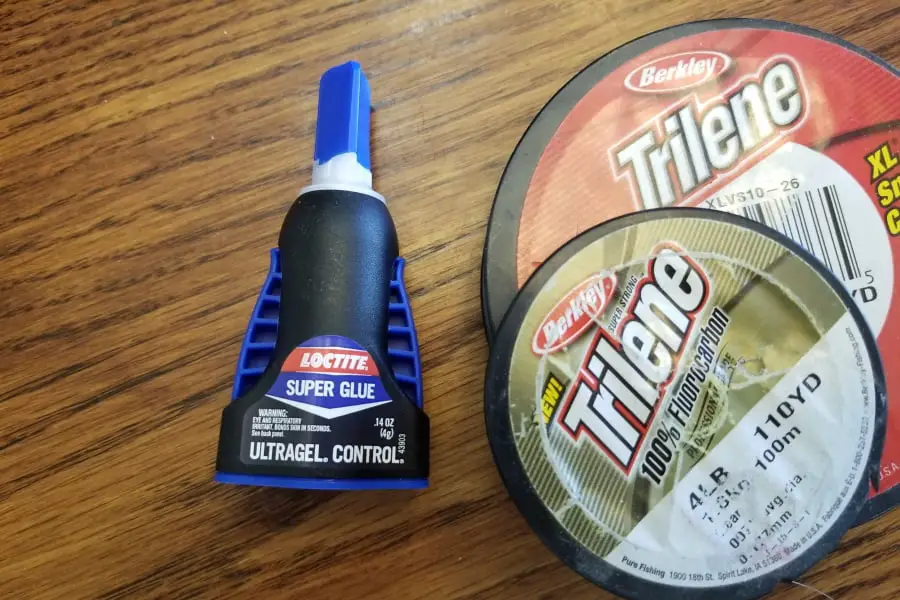
Super glue is commonly applied to fishing line to strengthen knots. Many do it without thinking about it, which might lead you to wonder if it’s the right thing to do or if you’re only doing it because you saw your grandfather doing it on his last fishing trip.
So, is super glue ok on fishing line? Yes, it should be ok to use super glue on fishing line, and it won’t negatively affect the strength of your knot. If you’re worried about if the super glue is safe for the environment, it should not affect the water itself or the fish; it is environmentally safe and should not harm anything.
You should consider experimenting with using different types of knots in your line, which may strengthen your line without the use of super glue. Also, there might be some other options for you to use besides super glue if you find the glue to be too messy and sticky.
Read on for more information about using super glue on your fishing line!
Does Super Glue Affect Strength of the Knot on the Line?
The biggest consideration when thinking about super glue is if it has any effect on the strength of your knot, and thus the ability of your line to do its job – hook that big fish without breaking!
- It adds to the knot’s integrity: Superglue only serves to bolster the strength of your knot.
- It is like double or triple knotting your line: Using superglue actually just acts like you are adding more knots to your line. If you don’t want to use super glue, you can get a similar effect by adding additional knots.
Super glue definitely will not take away anything from your line’s ability to function. There’s no danger of your line breaking because of the glue. If anything, it adds strength and might help your line when you are reeling in that big catch!
Types of Super Glue
What types of super glue are there that might meet your needs?
- UV Knot Sense – this cures in seconds when exposed to sunlight, so it might be a great quick-drying option. It also remains soft and pliable so it won’t feel like a rock on the end of your line.
- Zap-A-Gap – this glue is popular among fishermen as it is very versatile.
- Loctite Gel – this gel is pretty flexible and might be easier to work with and apply than other super glues.
- Crazy Glue – Good ol’ fashioned Crazy Glue can be a great option. It comes with a brush applicator and can be easy to use and apply while out on the water.
There are a few different types of glue that would meet your needs. The important thing to remember is that it should contain cyanoacrylate, meaning it will dry fast and strong. You really can’t go wrong with any of those on the list above!
What Knots Need Super Glue?
What types of knots should you glue? You can glue any knot, but in reality, some knots are so strong and secure that glue wouldn’t help and isn’t needed.
You probably don’t need to glue these types of knots:
- Blood Knots – this knot is used to join two lines together, and it’s not advisable to use super glue in that case.
- Double Surgeon Knots – similar to the above, it’s used for joining two knots together, and you’d actually want to consider lubricating these lines, not gluing them.
- Bimini Twist – this knot actually creates a loop, and you want this loop to be lubricated, not firm.
Whereas, it is a good idea to glue these types of knots to give them added support:
- Nail Knot – with this knot, you’re looking to permanently join a fly line to a leader, and glue would help strengthen this knot.
- Albright Knot – this knot is used to join two different types of fishing lines together. Since they are different in diameter, glue would help fortify this knot.
You’ll want to research the types of knots you intend to super glue. Some are great candidates for glue, and others are not as good of a candidate. Here’s a book on Amazon that would be a good starting point on the different types of fishing knots: The Pocket Guide to Fishing Knots
Environmental Concerns About Using Super Glue on Fishing Line
We’ve decided that it won’t affect the quality of your knot or your line, and thus you might not be able to blame a day with no success fishing on super glue. However, is it safe for the environment to use super glue? Will it affect the quality of the water, and will it affect other fish and marine life in the water?
It is actually perfectly safe to use super glue inside an aquarium to fix broken glass and broken aquarium plants. Not only that, after letting super glue dry for a few minutes, water can actually help speed up the drying process.
You can rest easy – using super glue on your line will not harm the environment! If it’s safe enough to use in a small aquarium, it’s certainly safe enough to use in a large body of water!
Do Professional Fishermen Use Super Glue on Fishing Line?
When in doubt, refer to the professionals. Nothing beats experience after all. There is a common trend amongst professional fisherman – they do coat their knots with a dab of glue. If the pros are using super glue to assist them, then you shouldn’t be afraid to either!
An Alternative to Super Glue: Aquaseal
Are you still not sold on using super glue? What else can you use? Try some Aquaseal as an alternative to super glue. Aquaseal is great for sealing leaks, so you might already have some in your boat, and it’ll also work to strengthen your knots.
The biggest downside to using Aquaseal is that it takes a lot longer to dry than using super glue. Super glue should be Choice A, but Aquaseal could work in a pinch as a backup, and it dries clear and pliable!
Storing your Super Glue
In order to get the most out of your super glue, do not store your super glue on the boat. You’ll want to ensure you always put the cap back on tightly, there is no residue around the seal, and store it in a cool dry place away from sun and heat.
After you realize how easy and effective using super glue on your fishing line is, you won’t want to reach for it just to have it dried out and unusable!
Isn’t Super Glue Messy?
Did you just glue your fingers together? Wondering how to get that sticky substance off your hands? Many of these glues come with brushes, or you can squeeze right out the bottle without ever touching the glue, so things shouldn’t be as messy as you might think.
Here are a couple videos available on YouTube that might help you visualize how to apply super glue to your fishing line.
While the above videos on YouTube can be used as a tool to help you see how to apply super glue to your fishing line, you can also clean it off your hands in the event you do make a mess. If washing with soap and water doesn’t do the trick to remove the glue, try applying some nail polish remover first and then peeling it off.
Is Super Glue Safe for Your Fishing Line?
Go ahead and use super glue with a clear mind! Super glue will not harm the fish, will not harm the body of water the fish are in, and will only serve to strengthen your fishing line. Using super glue can help make your fishing line stronger, and will only aid in your quest for the biggest catch!
